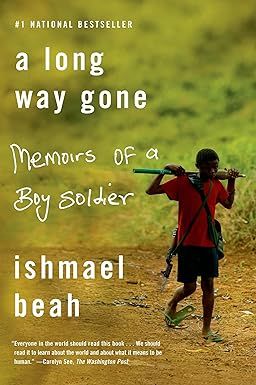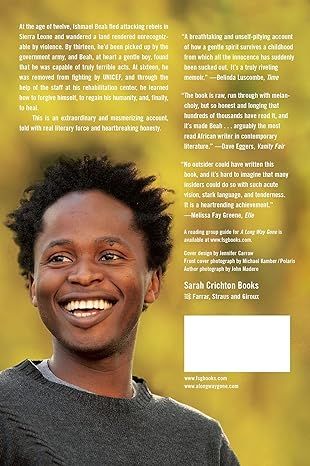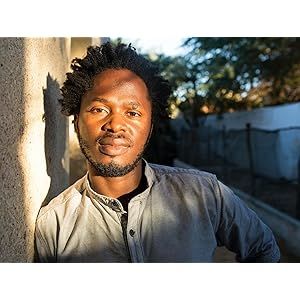


A Long Way Gone
4.6 out of 5
7,450 global ratings
This is how wars are fought now: by children, hopped-up on drugs and wielding AK-47s. Children have become soldiers of choice. In the more than fifty conflicts going on worldwide, it is estimated that there are some 300,000 child soldiers. Ishmael Beah used to be one of them.
What is war like through the eyes of a child soldier? How does one become a killer? How does one stop? Child soldiers have been profiled by journalists, and novelists have struggled to imagine their lives. But until now, there has not been a first-person account from someone who came through this hell and survived.
In A Long Way Gone, Beah, now twenty-five years old, tells a riveting story: how at the age of twelve, he fled attacking rebels and wandered a land rendered unrecognizable by violence. By thirteen, he'd been picked up by the government army, and Beah, at heart a gentle boy, found that he was capable of truly terrible acts. This is a rare and mesmerizing account, told with real literary force and heartbreaking honesty.
About the authors
Ishmael Beah
Ishmael Beah, born in Sierra Leone, West Africa, is the # 1 New York Times & international bestselling author of "A Long Way Gone, Memoirs of a Boy Soldier" & "Radiance of Tomorrow, A Novel." His books have been published in over 40 languages and won numerous prestigious awards and reviews. His Memoir was nominated for a Quill Award in the Best Debut Author category for 2007. Time Magazine named the book as one of the Top 10 Nonfiction books of 2007, ranking at number 3. Carolyn See from The Washington Post wrote, “Everyone in the world should read this book… We should read it to learn about the world and about what it means to be human.”
His novel, written with the gentle lyricism of a dream and the moral clarity of a fable is a powerful book about preserving what means the most to us, even in uncertain times.
The New York Times finds in his writing an "allegorical richness" and a "remarkable humanity to his characters". His forthcoming book "Little Family, A Novel" will be published in April 28, 2020 by Riverhead Books (Penguin USA).
He is a UNICEF Goodwill Ambassador and advocate for Children by War, and a member of the Human Rights Watch Children Advisory Committed. He lives in Los Angeles, California with his wife and three children.
Read more
Reviews
Jodee
5
Best book I’ve read all year long!!!
Reviewed in the United States on May 14, 2024
Verified Purchase
A Long Way Gone is inspiring but also a horrific memoir that talks about the author Ishmael Beah's experiences as a child soldier in his home land Sierra Leone. Because of his vivid and strong storytelling abilities, Ishmael takes us (his audience) on a journey through the horrors of war, end of his childhood, the loss of his innocence, and the ultimate redemptive power of hope and compassion, all while he is just a young boy. This powerful and unforgettable book is a true horror story of how a young boys spirit is able to endure even the most unimaginable circumstances possible
Read more
Kit
5
What a piece of work is man...
Reviewed in the United States on June 20, 2007
Verified Purchase
No matter how you slice it, Ishmael Beah is an amazing man.
This autobiographical account of his life details how a happy, cheerful young boy became a merciless soldier at the age of thirteen (and was not the oldest by far). How he went form living with his family in a small village in Sierra Leone to being a drug-addicted killer, ready to gun down anyone who got in the way. Not just killing people, but often doing so in especially brutal ways.
Most importantly it details his transformation back from the brink of seemingly endless death and violence into a college-educated young man and exceptional writer.
This is, without a doubt, one of the most harrowing, heartbreaking and moving stories I have ever read. Beautiful and honestly written. Passionate and personal, but also painting a larger picture of a world most of will, thank goodness, never experience.
For me personally the image that remains most stark is one of a neighbor of Ishmael's, a boy about his age, who is fleeing their village. The boy is carrying a sack of goods from his family's home. The only things he has left of his entire world. But it slows him down, then gets caught between a couple stumps. What happens to the boy is up to the reader to guess, but given that he was being shot at at the time, the likely conclusion is all too grim.
(rant approaching) Too often we Americans, comfortable in our relatively easy lives, are inclined to forget the rest of the world. If you asked the average person on the street to name five countries in Africa, they MIGHT get Egypt and South Africa, and then would probably wind up including Afghanistan. Our ignorance about the rest of the world in general and Africa in particular is inexcusible.
More than just about anything else this book convinces me that we, as a nation, need to do some sort of "Marshall Plan" for Africa. We can't go in with guns and bombs and make them like us. But we can go in with money, and schools, and medicine. Africa has all the resources it needs to be doing well. But they nevertheless continue to basically suck. Something must be done.
I highly recommend this book to readers 10 years or older. I especially recommend it to people who are in their early teens. Perhaps they can learn the horrible lessons Ishmael learned at their age without going through the traumas he experienced.
The one real criticism I have of the book is that, like "The Sopranos", it didn't END, so much as just STOP. One moment things are happening, you turn the page, and that's it. It's a minor complaint, but it's still there.
This is a book about horrible, horrible war, violence and despair. But it's also a book about hope. I started this review with a quote from Shakespeare, but I shall end with a quote from Cicero who once observed that, "While there's life, there's hope."
Read more
9 people found this helpful
rafael
5
A Long Way Gone Review
Reviewed in the United States on May 16, 2024
Verified Purchase
A Long Way Gone by Ishmael Beah is more than just a story, it's a real life account of surviving unimaginable hardships. Ishmael's experience as a child soldier in Sierra Leone makes his story credible and powerful, showing the true impact of war. His detailed descriptions of his struggles and emotional journey touched my heart, making me feel deep empathy and compassion. Ishmael's narrative reveals the harsh realities faced by many children in war zones. This book is essential for anyone who wants to understand the real cost of conflict and the incredible strength of hope and recovery.
Read more
Michelaneous by Michele
5
"Children have the resilience to outlive their sufferings . . .
Reviewed in the United States on February 7, 2008
Verified Purchase
. . . if given a chance."
Ishmael Beah, author of this remarkable and very disturbing memoir, is living proof of this statement. It was a statement initially prepared for him as a spokesperson on the issue of child soldiers during his rehabilitation period, and one he learned to repeat again and again, as he outlived not only this wartime sufferings, but also all of his family members and most of his friends.
"Why does everyone keep dying except me?" is a question that plagues him, and plagues the reader as well upon reading brutal account after brutal account of rebel attacks on otherwise peaceful villages in the West African country of Sierra Leone. It takes a strong stomach to read his gut-wrenching descriptions of the killings. But Beah is a gifted writer with a clear memory and the ability to relate vivid visual descriptions and express his feelings. This book gives new meaning to the phrase: "living to tell the tale."
For example: "Every time people come at us with the intention of killing us, I close my eyes and wait for death. Even though I am still alive, I feel like each time I accept death, part of me dies. Very soon I will completely die and all that will be left is my empty body walking with you. It will be quieter than I am." These were the words of a friend from a time before Beah and his group of teenage boys became drug-addicted, AK-47-carrying soldiers.
This is an important work about learning to understand not only the mind of a child soldier, but also the reasons behind how and why children become soldiers. Beah includes a chronology of events in Sierra Leone from 1462, when written history for the region began, until March, 2006. Very well written with a lot of rap and reggae music undertones, by a charming, educated, lucky, and grateful young man. Highly recommend.
Michele Cozzens, Author of A Line Between Friends and The Things I Wish I'd Said.
Read more
6 people found this helpful
voracious reader
4
Compelling
Reviewed in the United States on July 4, 2008
Verified Purchase
This is a compelling true story. A boy named Ishmael leaves his comfortable life in an African village to attend a rap music event with his brother and a few friends. While he is gone, rebel forces attack his village destroying his home and family life. He, his brother, Junior, and his friends then wander the countryside of Sierra Leone trying to survive and avoid both the rebel and government troops. Identifying the enemy is difficult in a country rich in resources and awash with government corruption. Ishmael is separated from his group and eventually attaches himself to another group of teenage boys all under 16. Eventually, the war catches up with him and he and his little band are conscripted into the government troops. For the next two or more years and armed with an AK 47 and RPG's, he kills, maims, and robs in the name of the government. These boy soldiers take many drugs to dull their feelings and allow themselves to participate in the inhumane slaughter. Finally, aid workers either buy the boys' freedom or settle with their army leader and obtain their release. They are taken into the custody of rehabilitation counselors where they are given an opportunity for redemption. Ishmael clearly a natural leader is selected to travel to New York to attend a U.N. conference on child soldiers. While there he makes many friends. I understand that he was taken in by one of them and that he subsequently attended Oberlin college.
I gave this book 4 stars instead of 5, because it drags a bit during the years of army participation and killing. Further, Ishmael's parents are divorced, but he lives with his father. His family is Muslim and that may be why the father retained custody. Very telling in the book was a description on pg. 77 (hardback) of his formal naming ceremony. A huge feast is prepared. First the elders eat their fill, then the men, then the boys and lastly the women and children. I presume that if there isn't enough to share, the women and children starve. I don't know if the author realized what he revealed about his culture by this telling description. However, we never learn the basis of the divorce or why his father retained custody. Living conditions were somewhat primative. The houses were made of concrete brick or mud and they had tin roofs which were particularly noisy when it rained. Their diet was complete though not luxurious, and they were not hungry. However, they walked for miles to save bus fare and did not have electricity or telephones in their homes. Sierra leone sounds like a terrible place. The film, Blood Diamond, was about a similar subject.
I really don't know if there is a solution when countrymen kill one another over money, resources, and power. However, perhaps, this book and the film, Blood diamond, will be the stimulus for a resolution.
This book was worth reading, and I recommend it.
Read more
4 people found this helpful
Best Sellers

The Great Alone: A Novel
4.6
-
152,447
$5.49

The Four Winds
4.6
-
156,242
$9.99

Winter Garden
4.6
-
72,838
$7.37

The Nightingale: A Novel
4.7
-
309,637
$8.61

Steve Jobs
4.7
-
24,596
$1.78

Iron Flame (The Empyrean, 2)
4.6
-
164,732
$14.99

A Court of Thorns and Roses Paperback Box Set (5 books) (A Court of Thorns and Roses, 9)
4.8
-
26,559
$37.99

Pretty Girls: A Novel
4.3
-
88,539
$3.67

The Bad Weather Friend
4.1
-
34,750
$12.78

Pucking Around: A Why Choose Hockey Romance (Jacksonville Rays Hockey)
4.3
-
41,599
$14.84

Start with Why: How Great Leaders Inspire Everyone to Take Action
4.6
-
37,152
$9.99

Tomorrow, and Tomorrow, and Tomorrow: A novel
4.4
-
95,875
$13.99
